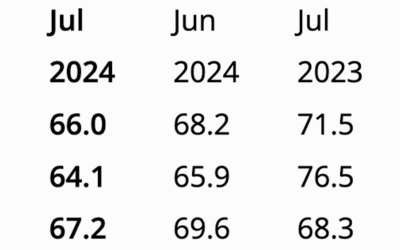The enduring principles—and ongoing change—of football (and investing)
The enduring principles—and ongoing change—of football (and investing)

The plan for an effective investment portfolio should be like a playbook, with different risk-managed strategies designed to perform during a variety of market conditions across long time frames.
The one constant of football at all levels is that things are always changing. But the fundamental principles and lessons of the game have endured for decades.
Like many of you, I was excited to see the start of another season of pro football, which, as I write this article, just completed its third week.
The game on Thursday, Sept. 7 (NBC’s “NFL Kickoff Game”), was a memorable start to the season. The resurgent Detroit Lions knocked off the favored Super Bowl champion Kansas City Chiefs, 21-20.
In a rare occurrence, the New York Giants and the New York Jets, who share a stadium, played back-to-back nights during the first week. Both organizations had moving pregame remembrances of the anniversary of 9/11, with tributes to those who perished.
Throughout the first three weeks, we have seen the not-so-surprising events typical of every season: injuries to key players, dominant performances by top teams, major upsets reflecting the “on any given day” mantra, head coaches perhaps already in some jeopardy, and disappointed fans—whose high hopes for their teams are not coming to fruition so far.
As always, the NFL saw new developments heading into this season, including the following notable ones:
- While it offers little solace to last year’s San Francisco 49ers playoff team, the rules of game-day roster construction have been changed (in a complicated fashion), effectively allowing teams to carry a third “emergency” quarterback.
- According to ESPN, the league has changed its “flex scheduling” policy for late-season games on Monday and Thursday nights. This theoretically will allow for stronger, more attractive matchups in prime time.
- In further efforts to limit concussions, the NFL changed the rule on fair catches of kickoffs inside the 25-yard line. The ball will now be placed on the receiving team’s 25-yard line, giving an incentive for teams to avoid running the ball back on short kicks.
- Few shake-ups have occurred in the national network broadcast booths, but NBC New York affiliate WNBC reminds us that “Tom Brady is expected to jump to the top FOX broadcast team next season.” The big news, I think, is the ever-growing and confusing array of options where fans can watch NFL games—split between broadcast TV, cable, and streaming. The Boston Globe calls it an annoying, increasingly expensive, and “fractured media landscape.”
- Topping the news of veteran quarterbacks now with new teams, says CBS Sports, was Aaron Rodgers’ move to the NY Jets (which unfortunately took a huge setback with Rodgers’ first-game potential season-ending injury)—followed by Derek Carr going to the New Orleans Saints, Baker Mayfield joining the Tampa Bay Buccaneers, and Jimmy Garoppolo ending up with the Las Vegas Raiders. The other big quarterback news was the record-breaking contract given to the Cincinnati Bengals QB Joe Burrow—$275 million over five years.
‘Defense wins football games’—and other investment analogies
In interviewing financial advisors for Proactive Advisor Magazine, many of whom are strong advocates of an active, risk-managed approach for their clients’ portfolios, I have heard more than once, “Winning football starts with a strong defense, as does investing.”
One of the authors for our publication took the football analogy a bit further for an article a few years ago called “Agility drills for client investment portfolios.”
I got a big kick out of the article by Mike Posey of Theta Research, who played high school football in Texas. Mike likens some aspects of football to several elements of sophisticated active investment management, citing some of the principles he believes are important to financial advisors and their clients, paraphrased here:
- Diversify. Just as it wouldn’t make much sense to field a team with players who all have the same skill sets or who all play the same position, an agile investment portfolio should also be diversified to include noncorrelated strategies, each with different strengths in the portfolio. Whether you call these strategies active, tactical, or alternative, they are characterized by rules-based approaches that seek to follow market trends rather than being victimized by them.
- Know the playbook. In an investment portfolio, it’s important for advisors to communicate why each investment strategy is included and what it is intended to do. In football, sometimes an aggressive passing style is called for on offense; at other times, a tightly controlled and conservative game plan is needed. Similarly, it’s equally important to make sure that multiple investment strategies are represented in clients’ allocations and not just multiple asset classes. To be effective, the overall plan for a portfolio should be like a playbook, with different strategies designed to perform during a variety of market conditions across long time frames.
- Watch the films. Saturday morning after Friday’s high school games is always dedicated to watching the game films. Reviewing the films is akin to advisors monitoring their clients’ portfolios regularly. This is not to say that anyone—client or advisor—should be overly concerned with scrutinizing performance every day or every week. Instead, advisors should review their clients’ portfolios as frequently as quarterly and no less than annually. Such a review can help to determine whether the portfolio’s constituents are performing as expected and whether the risk level is appropriate.
- Be ready for unplanned opportunities. Mike points out that his high school’s talented quarterback was skilled at reading defenses and could make spectacular gains by changing plays on his own at the line of scrimmage. (However, these unplanned “excursions” could also fail equally spectacularly.)
He says that advisors need to be aware that their clients are the target of direct advertising for a wide variety of investments, including precious metals, real estate, and even private equity opportunities.
In such cases, advisors need to take on the role of coach and help evaluate these opportunities in a disciplined manner on behalf of their clients. Going back to the playbook, the advisor might be able to show the client how the same or similar opportunities are already present in their portfolio holdings. Most importantly, however, is the need to realize that investment products marketed directly to investors are sometimes subject to higher risks than disclosed in the flashy marketing brochures promoting them.
- Keep fantasy football in its place. A final point in this analogy is to be wary of the investment equivalent of fantasy football. Backtesting can be a valid and productive analytical tool when used properly, and a dangerous tool when used improperly. Investment advisors must resume their coaching role and make sure that not only are trading strategies evaluated properly but also the methodology of producing backtests.
Mike summarized,
“Failure to include agile investment strategies can be costly. In football, the lack of agility can result in an opposing team’s score, or your own team’s fumble or tackle for a loss. For an investment portfolio, the lack of ability to adapt to market conditions can result in huge losses. …
“The problem is that many investment portfolios today are passive, the very opposite of agile. If there has ever been a time when investment advisors should be concerned about the agility of their clients’ portfolios, it’s right now. We all know what happened to buy-and-hold investment strategies in the early 2000s and again in 2007–2009. Were your clients invested with enough agility to avoid those large losses—and those of prior bear market periods? …
“After 30-plus years in the investment industry, and having lived through markets of all types, I have come to some firm convictions. By including actively managed strategies in your clients’ portfolios, they will have a better chance, I believe, of being on the winning team and reaching their investment goals.”
If you are a fan, hopefully, you will greatly enjoy this year’s football season, whether you root for a high school, college, or professional team!
The opinions expressed in this article are those of the author and the sources cited and do not necessarily represent the views of Proactive Advisor Magazine. This material is presented for educational purposes only.
 David Wismer is editor of Proactive Advisor Magazine. Mr. Wismer has deep experience in the communications field and content/editorial development. He has worked across many financial-services categories, including asset management, banking, insurance, financial media, exchange-traded products, and wealth management.
David Wismer is editor of Proactive Advisor Magazine. Mr. Wismer has deep experience in the communications field and content/editorial development. He has worked across many financial-services categories, including asset management, banking, insurance, financial media, exchange-traded products, and wealth management.
RECENT POSTS








